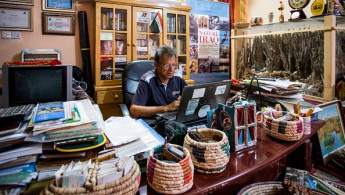Iraqi environmentalist, marshlands campaigner Jassim al-Assadi freed from kidnappers
A leading campaigner for the preservation of Iraq's famed southern marshlands has been freed, two weeks after he was kidnapped by unidentified gunmen, his family said on Thursday.
Jassim al-Assadi, 65, head of environmentalist group Nature Iraq, was seized on February 1 as he drove to the capital Baghdad on the main motorway from the south.
"Jassim al-Assadi has been freed from the clutches of his kidnappers," his brother Nazem told AFP.
"Thanks to everyone who supported us through this ordeal... thanks to the prime minister (Mohammed Shia al-Sudani) for his support and his determination to uphold law and order, thanks to the security forces".
Nazem al-Assadi declined to elaborate on how his brother had been freed. The motive of his kidnappers remains unclear.
While Iraq has regained relative stability after decades of conflict and unrest, assassinations and kidnappings of activists and officials remain common.
A hydraulic engineer by profession, Assadi has been involved in numerous initiatives since 2006 to restore the marshlands where he was born.
The wetlands on the floodplains of the Euphrates and Tigris rivers had been progressively drained by successive Iraqi governments, before dictator Saddam Hussein sharply accelerated the process in the 1990s in a bid to crush resistance to his rule by opposition groups using the region as a hideout.
Listed as a UNESCO World Heritage Site in 2016, the marshes now face the threat of global warming.
The United Nations says Iraq is one of five countries most exposed to some impacts of climate change.
The marshes have also been hit by reduced flow in the Tigris and Euphrates rivers and their tributaries due to dams built in upstream countries.





 Follow the Middle East's top stories in English at The New Arab on Google News
Follow the Middle East's top stories in English at The New Arab on Google News


